
VIA “huffingtonpost.com” by Jesse Rifkin
The average age of a state legislator nationwide is 56, but that didn’t stop these folks from running for office. With differing political ideologies and representing a range of states, they share one uncommon characteristic: their youth. The youngest one was elected at 18, and even the oldest is only 23. Meet the 12 youngest state legislators in the country, as far as we could tell.
If you know a legislator who belongs on this list, please email us here.
-
1 Saira Blair, born 1996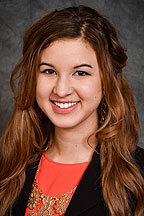 West Virginia LegislatureBlair became a media sensation in November 2014, after the 18-year-old Republican won a seat in the West Virginia House of Delegates. The college freshman at West Virginia University was interviewed by outlets ranging from The Washington Post and Time magazine to Teen Vogue. “I’ve taken more criticism in the past year doing this than I would have in 10 years if I wasn’t doing this,” Blair told HuffPost, “but it’s worth it.”
West Virginia LegislatureBlair became a media sensation in November 2014, after the 18-year-old Republican won a seat in the West Virginia House of Delegates. The college freshman at West Virginia University was interviewed by outlets ranging from The Washington Post and Time magazine to Teen Vogue. “I’ve taken more criticism in the past year doing this than I would have in 10 years if I wasn’t doing this,” Blair told HuffPost, “but it’s worth it.” -
Her father, Craig Blair, is a Republican lawmaker, too, in the state Senate. But in some respects the daughter, who represents a rural district, is actually more conservative. He supports access to the morning-after pill, for example, while she opposes it. The current legislative session has only been going since January and hasn’t yet afforded them the opportunity to cast opposing votes, though she said with a laugh, “It will probably happen soon!”
Blair said the most difficult part of her new role so far is living full-time in the state capital of Charleston, five hours away from her hometown of Martinsburg. Her favorite part is learning about so many different areas of public policy that she wouldn’t have even considered previously. “We were just dealing with a bill regarding regulation of barbers and cosmetologists, which I didn’t know anything about before,” Blair said. She added that it will definitely give her a different perspective the next time she gets a haircut.
-
2 Aundré Bumgardner, born 1994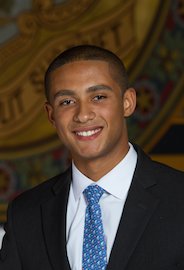 Connecticut House GOPBumgardner was the only Republican on the ballot to win in his blue Connecticut district. “I had to knock on over five thousand doors,” the 20-year-old said. “A lot of people didn’t think I had the life experience to be a legislator, but it doesn’t require experience per se. Mostly it requires listening unequivocally to others and the art of negotiation.”
Connecticut House GOPBumgardner was the only Republican on the ballot to win in his blue Connecticut district. “I had to knock on over five thousand doors,” the 20-year-old said. “A lot of people didn’t think I had the life experience to be a legislator, but it doesn’t require experience per se. Mostly it requires listening unequivocally to others and the art of negotiation.”Inspired by his fourth- and fifth-grade teacher Heidi Simmons, wife of former U.S. Rep. Rob Simmons (R-Conn.), Bumgardner made his first foray into politics volunteering for the latter Simmons’ unsuccessful 2010 Senate run. His first bill as a state representative himself proposes a water taxi to link several attractions along the Thames River in his tourism-dependent district.
“I don’t meet the litmus test for your conventional Republican, whether by my race or my age,” acknowledged Bumgardner, who attended Stetson University in Florida before moving back to Connecticut and is now a part-time student. “But since my district is historically blue, I can’t be a partisan zealot or create more problems in the statehouse than I solve. Because of that, Democrats so far have actually welcomed me with open arms.”
Bumgardner paused and then added, “And of course, the Republicans think it’s great they have the young guy on their side.”
-
3 AJ Edgecomb, born 1993 Maine LegislatureEdgecomb decided he needed to run for office in Maine and represent young GOP voices after he tried to start a conservative group on his college campus. “They had a Democratic Club [at the University of Maine-Presque Isle] so I wanted to start a Republican Club,” he said. “I got two other people.”
Maine LegislatureEdgecomb decided he needed to run for office in Maine and represent young GOP voices after he tried to start a conservative group on his college campus. “They had a Democratic Club [at the University of Maine-Presque Isle] so I wanted to start a Republican Club,” he said. “I got two other people.”His grandfather, Peter Edgecomb, was a state representative and is now a state senator, so the younger Edgecomb had a model. But he noted there are challenges at his age. “I’ve lived through only three governors, but during the first two I wasn’t paying attention to politics yet, so really I only know one governor. Unlike the 60- or 70-year-olds, I haven’t seen firsthand what works and what doesn’t work.”
Still, he’s ready to make his mark in the state House of Representatives. His first bill would allow fishermen to take home their catch from Webster Stream, a waterway that currently only permits catch-and-release.
-
4 Drew Christensen, born 1993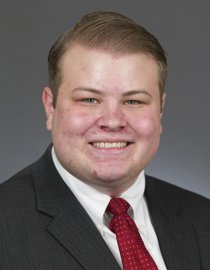 Minnesota House of RepresentativesChristensen had to defeat opponents in their 60s for both the Republican Party nomination and the general election to win a seat in the Minnesota House of Representatives. “Certainly they had more life experience than I did, so I had to make the case to voters that I would bring a different perspective,” the 21-year-old said.
Minnesota House of RepresentativesChristensen had to defeat opponents in their 60s for both the Republican Party nomination and the general election to win a seat in the Minnesota House of Representatives. “Certainly they had more life experience than I did, so I had to make the case to voters that I would bring a different perspective,” the 21-year-old said.For example, his current status as a senior at the University of Minnesota informs his positions on the Higher Education Committee, although he noted that his legislative service means “I definitely have to take a reduced course load this semester.” His first bill aims to reform the practice of “school shift,” in which state funding for local school districts is only partially provided on time as a gimmick to make the state budget appear balanced.
-
5 Kayla Kessinger, born 1992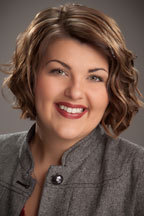 West Virginia House of DelegatesKessinger, who had long been politically active, was inspired to run for the West Virginia House of Delegates after looking at its demographics. “The legislature is supposed to represent the people,” the 22-year-old Republican said, “but how could they fully represent the people if there were nobody around my age?”
West Virginia House of DelegatesKessinger, who had long been politically active, was inspired to run for the West Virginia House of Delegates after looking at its demographics. “The legislature is supposed to represent the people,” the 22-year-old Republican said, “but how could they fully represent the people if there were nobody around my age?”She won her seat by a mere 83 votes, but that didn’t restrain her ambitions. Her first bill aimed to reform the state judiciary by requiring nonpartisan elections. It passed the House and then, with only one dissenting vote, the Senate.
Now working in human resources for the coal industry contracting company Green Leaf Services while attending Concord University as a public relations major, Kessinger has a message for people her age. “Our generation has been jaded by the political process. We see a lot of division primarily between the political parties, so we’re reluctant to get involved because we’ve lost faith,” she said. “But that’s why it’s important to get involved. If you’ve grown jaded by the political process, then change the political process.”
-
6 Ryan Fecteau, born 1992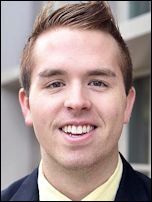 Maine House of Representatives“Maine has the oldest population in the country, all the young people leave, so I wanted a voice in Augusta to represent young people,” said Fecteau, a Democrat and a Catholic University graduate. Senior citizens are always a legislative priority, he said, “but we need the population to sustain those programs, a young workforce to create labor and act entrepreneurial.” For that reason, he said, his focus on the young serves not only his generation: “If we don’t talk about the young, we’ll be missing the boat on both the young and the old.”
Maine House of Representatives“Maine has the oldest population in the country, all the young people leave, so I wanted a voice in Augusta to represent young people,” said Fecteau, a Democrat and a Catholic University graduate. Senior citizens are always a legislative priority, he said, “but we need the population to sustain those programs, a young workforce to create labor and act entrepreneurial.” For that reason, he said, his focus on the young serves not only his generation: “If we don’t talk about the young, we’ll be missing the boat on both the young and the old.”In the Maine House of Representatives Fecteau’s first introduced bill would tweak an existing tax credit program to make it easier for young people to qualify for a home mortgage. He said that Matthew Pouliot, another 20-something lawmaker from the other side of the aisle, has proposed a similar bill, demonstrating the shared priorities of younger legislators.
-
7 Travis Bennett, born 1992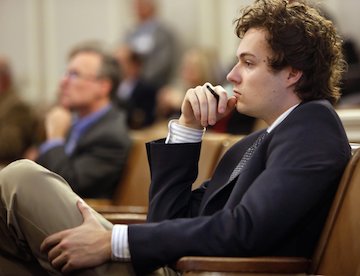 AP Photo/Jim ColeNew Hampshire famously has the nation’s largest House of Representatives with 400 members, nearly double the size of the second-largest in Pennsylvania. “I wasn’t sure if I should go for this, but my local town committee was having a hard time finding enough people to fill all the spots,” said Bennett, a 22-year-old Democrat.
AP Photo/Jim ColeNew Hampshire famously has the nation’s largest House of Representatives with 400 members, nearly double the size of the second-largest in Pennsylvania. “I wasn’t sure if I should go for this, but my local town committee was having a hard time finding enough people to fill all the spots,” said Bennett, a 22-year-old Democrat.He called it “an amazing opportunity” but also took issue with institutional hurdles that make it difficult for young people to serve, particularly the meager compensation. New Hampshire has one of the lowest rates of legislative pay, according to the National Conference of State Legislatures.
“There are bills being introduced this session to limit college students’ right to vote,” said Bennett, a student at Plymouth State University, of the Republican-dominated legislature. “I think that sends the wrong message to young people who might want to get involved in the political process.”
-
8 Avery Bourne, born 1992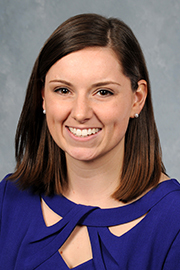 Illinois General AssemblyBourne hasn’t been serving for too long yet … in fact, only since Wednesday. Appointed to a seat in the Illinois House of Representatives by county party leaders after her predecessor left to head the state Department of Natural Resources, Bourne was the youngest of the 10 candidates to apply. “I’ve lived in this rural district in downstate Illinois for my entire life, and my family’s been farming corn and soybeans here for generations,” the 22-year-old Republican said.
Illinois General AssemblyBourne hasn’t been serving for too long yet … in fact, only since Wednesday. Appointed to a seat in the Illinois House of Representatives by county party leaders after her predecessor left to head the state Department of Natural Resources, Bourne was the youngest of the 10 candidates to apply. “I’ve lived in this rural district in downstate Illinois for my entire life, and my family’s been farming corn and soybeans here for generations,” the 22-year-old Republican said.Now a first-year law student at Washington University in St. Louis, she holds as her legislative role models U.S. Reps. Aaron Schock (R-Ill.), who was previously the youngest member of the Illinois legislature, and Elise Stefanik (R-N.Y.), who’s now the youngest member of Congress. “As a young female legislator,” Bourne said, “I can bring a different voice than my predecessors might have been able to and hopefully bring new attention to the 95th District.”
-
9 Jeramey Anderson, born 1991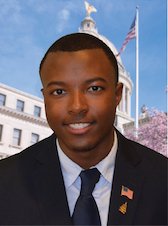 Mississippi House of Representatives“Most of my colleagues in the legislature see me as like their son or their grandson,” Anderson said. He paused. “Or their great-grandson.”
Mississippi House of Representatives“Most of my colleagues in the legislature see me as like their son or their grandson,” Anderson said. He paused. “Or their great-grandson.”Now a senior at a Tulane University branch campus, the Mississippi Democrat said the most difficult part is balancing private life with the demands of political life. “How do you continue to really be a 23-year-old while also being held to such a high standard in politics?” Anderson asked rhetorically. “I’m still trying to figure that out.”
His proudest accomplishment so far is leading the fight to defeat a bill that would have capped Mississippi scholarships for students scoring above a 30 on the ACT if they had accumulated a certain amount in outside scholarships. Anderson talked to low-income and single-parent households who needed all the funding they could get. The bill actually passed its first time around but was brought up for reconsideration. Anderson passionately spoke against it on the floor, a handful of other representatives switched their votes, and the measure was defeated.
Anderson, who also founded and serves as CEO of the nonprofit youth mentoring organization Purple Knights of America, said he eventually wants to run for governor.
-
10 Alex Looysen, born 1991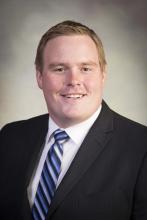 North Dakota Legislative BranchBeing just 23, Looysen said, there are some issues on his radar that aren’t necessarily priorities for most of his North Dakota colleagues. For example, the Republican representative recently introduced a bill that would grant student journalists greater speech rights. “It started with [University of] Jamestown students who pitched the idea directly to me,” said Looysen, speaking of his alma mater. “So that one really hit home.”
North Dakota Legislative BranchBeing just 23, Looysen said, there are some issues on his radar that aren’t necessarily priorities for most of his North Dakota colleagues. For example, the Republican representative recently introduced a bill that would grant student journalists greater speech rights. “It started with [University of] Jamestown students who pitched the idea directly to me,” said Looysen, speaking of his alma mater. “So that one really hit home.”Unlike most of other young legislators on this list, who had their eye on public office, Looysen didn’t immediately embrace the idea. His initial response to being recommended for the job was, “Heck no!” But concerns that his older colleagues would look down on him haven’t panned out, he said. “Sometimes they come up to me when a vote’s coming up and ask, ‘What do you and your friends think about this?'”
Looysen’s first bill extended the length of time to count ballots coming in from military personnel serving overseas.
-
11 Jennifer Sullivan, born 1991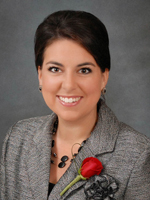 Florida House of RepresentativesSome young legislators may represent comparatively small constituencies in less-populated states. But that’s not Sullivan’s experience: Her Florida district totals more than 170,000 residents. “As someone entering this process, you have to prove yourself,” the 23-year-old Republican said, “but that’s true at any age.”
Florida House of RepresentativesSome young legislators may represent comparatively small constituencies in less-populated states. But that’s not Sullivan’s experience: Her Florida district totals more than 170,000 residents. “As someone entering this process, you have to prove yourself,” the 23-year-old Republican said, “but that’s true at any age.”When the seat in the state House of Representatives first became available, Sullivan, who had volunteered for political campaigns, initially urged somebody else to run. She now serves on four subcommittees, covering issues from agriculture and natural resources, to finance and tax, to civil justice.
“As a member of the millennial generation, we’ve so often been written off as an entitled generation with our heads in our phones all day long,” said Sullivan, who is taking online classes from Liberty University toward her degree. “So when somebody our age steps up, it’s so much more powerful because it’s so unexpected.”
-
12 Sarah Laszloffy, born 1991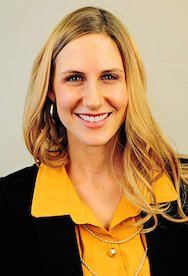 Montana LegislatureWhen Laszloffy introduced her first bill, she received some sarcastic comments from her largely middle-aged and older male colleagues. “‘Oh, human trafficking, I’ll bet that’s a big problem in Montana,'” the 23-year-old recalled them saying. “Actually it was a big problem, and it needed to be addressed. Some of these girls were as young as 11.” Among other provisions, her legislation now bars charging those under 18 with prostitution, instead treating those children as victims.
Montana LegislatureWhen Laszloffy introduced her first bill, she received some sarcastic comments from her largely middle-aged and older male colleagues. “‘Oh, human trafficking, I’ll bet that’s a big problem in Montana,'” the 23-year-old recalled them saying. “Actually it was a big problem, and it needed to be addressed. Some of these girls were as young as 11.” Among other provisions, her legislation now bars charging those under 18 with prostitution, instead treating those children as victims.Laszloffy was inspired to run by her father’s tenure in the state legislature, although she said, “We made an agreement when I ran that I would be my own Rep. Laszloffy.” In only three years, she has risen to serve as chair of the House Education Committee and majority whip for the Republicans. Now she wants to rectify her party’s gender imbalance in the state legislature, where only six of the 59 Republicans are women — while female Democrats outnumber the males.
Yet Laszloffy still has energy to burn. She signed off her HuffPost interview with a cheery “Thanks! Now I have to go run six miles up a mountain.”
CORRECTION: This post has been updated to reflect that AJ Edgecomb’s grandfather, not his father, is a state senator and was previously a state representative.
